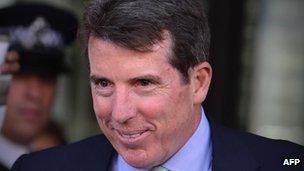Should bankers run banks?
- Published

Bob Diamond resigned as head of Barclays Bank after a rate-fixing scandal
A spate of banking scandals has tarnished the industry's already battered reputation.
There has been a furore over the fixing of the London inter-bank lending rate, known as Libor, which is considered to be one of the most crucial interest rates in finance.
Issues about money-laundering have also provoked intense scrutiny into the methods used by some banks.
Banks have been fined by regulatory authorities, but the scandals have also resulted in high-profile casualties such as Bob Diamond at Barclays, who have either resigned, or been forced to step down.
But when it comes to filling these vacant executive positions, should the candidate be yet another banker, or preferably someone from a totally different sector?
Different approach
There has been a trend in recent years to promote the professional boss - someone with management skills first and foremost, but not necessarily a background in the sector concerned.
"If a company is in need of dramatic transformation, you are more likely to be looking at a broader spectrum of people," says John Purcell at the London recruitment firm Purcell and Company.
That is not an approach that Dr Amanda Goodall of the Cass Business School would recommend.
Her research suggests that people who make the best leaders have: "A deep understanding and intuitive knowledge of the core business of the organisation they are leading."
She explains how important it is to move away from a fixation on leaders as individual charismatic people.
"We need to understand more about leaders," she says.
"There is a tendency for people to hire others who look like and sound like themselves," she maintains.
That could lead to the people being hired, being regarded as clones of the people they are replacing.
To change or not?
So to what extent should a company go for the professional manager, and to what extent should it seek someone who is actually within that sector?
Mr Purcell says it depends on the context that the company finds itself in.
"If the appointment is of the 'steady as you go variety' that would probably lead you to someone possibly internal or closely associated with whatever the organisation is."
The Cass Business School has been involved in the trend towards the professional manager, although Dr Goodall says you cannot substitute management education for a deep understanding of the core business of the organisation or sector.
She emphasises that people should not mistake intelligence for knowledge about an industry.
Mentioning companies which dominate our world today, such as Google, Apple, Facebook and even Amazon, she notes that these are led by technical experts.
"On Google's board," she says, "everybody has an engineering or a computer science degree."
Whilst recruitment expert Mr Purcell agrees there are times when a relevant degree is preferred, there are other occasions when somebody outside the sector might be better.
"If you are in a consumer-focused business, the transferable skills from retailing and marketing can be applied in a range of different ways," he says.
Dr Goodall observes: "If an institution or a sector has become corrupted, then you may well need to bring someone in from the outside to at least have some involvement in clearing that up."
She does have a caveat however:
"If you want a workforce that can be trusted and that can perform to the highest standards, then you need to have a leader who really understands what gets the best out of them and I believe to do that, you need to have someone at least from the same industry or from the same sector."